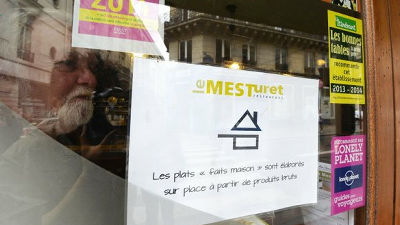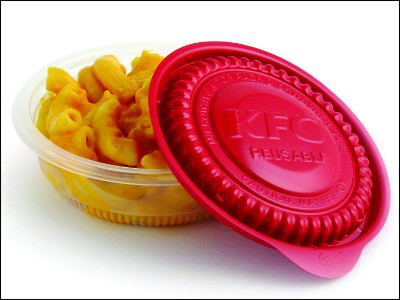France bans the use of disposable containers at fast food restaurants, out of paper as well as plastic

A law passed in 2020 in France will prohibit the use of single-use containers, plates and cups in fast food restaurants from January 1, 2023. This regulation will prohibit the use of not only plastic containers but also paper containers, and eat-in containers will use materials such as ceramic, resin, and glass.
France bans disposable packaging, utensils in fast-food restaurants
https://www.france24.com/en/live-news/20221219-france-bans-disposable-packaging-utensils-in-fast-food-restaurants
On February 10, 2020, France enacted the 'relative à la lutte contre le gaspillage et à l'économie circulaire', commonly known as the circular economy law. This law applies the EU Directives on landfills, packaging waste and plastic products to French law, setting strict waste regulations and recycling targets.
The circular economy law targets 100% plastic recycling by January 1, 2025, and from 2020, plastic cups, glasses, plates and cotton swabs are banned. Also, from 2021, straws, cutlery, take-out cup lids, polystyrene foam containers and bottles, etc. will be banned, and from 2022, tea bags, vegetable and fruit packaging, extra toys, and plastic packaging for newspapers and magazines will be banned. It has been.
And from January 2023, it will be mandatory to use reusable cups, glasses and cutlery for eat-in tableware. 'Reusable' here does not mean 'recyclable', but it means 'can be reused by washing and wiping' like ceramics and metal dishes. Therefore, using not only plastic but also paper cups and plates is out.
For example, McDonald's in France has ceramic potato containers and glass cups for drinks.
La loi anti-gaspillage, ce n'est pas seulement la fin des pailles en plastique. faire au niveau mondial. Changeons la donne ! https://t.co/sd0YRRv1ko
— Emmanuel Macron (@EmmanuelMacron) November 20, 2022
The use of paper is allowed as an exception for wrapping paper that wraps hamburgers and sandwiches, but only materials with a high recycling rate are still allowed.
On the other hand, the European Paper and Packaging Association (EPPA), which claims that single-use paper packaging boasts an 82% recycling rate, says that making and washing durable items consumes more energy and water. , alleging that it is contrary to environmental protection objectives.
In some restaurants, it is also a problem that customers take cups home without permission after meals, and throw away plates and cutlery in the trash without returning them. Subway, a sandwich chain, said that after months of testing, it should promote educational activities for the general public, such as making posters that make customers more aware that the tableware is reusable.
Also, Maria Valera, manager of McDonald's in the suburbs of Paris, said, ``We need to hire more people to explain that knives and forks are not garbage, and we need to buy an additional dishwasher.'' I'm here. He also said that the kitchen had to be remodeled to accommodate the new requirements. A series of regulations will impose significant costs on fast food restaurants.
Moira Turner of the non-profit organization 'Zero Waste France' said about this measure, 'It is a symbolic measure that if the law is properly enforced, people will see very concrete changes. There is no doubt. We are moving in the right direction,” he said.
Related Posts:
in Note, Posted by log1i_yk







